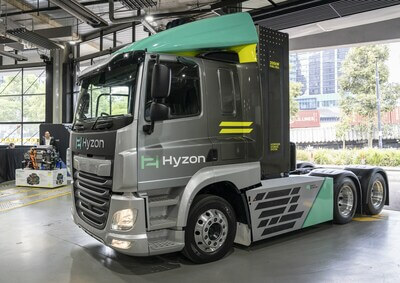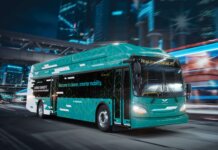Hyzon, a U.S.-based hydrogen fuel cell technology developer and supplier of zero-emission heavy-duty fuel cell electric vehicles (FCEVs), launched its single-stack 200-kilowatt fuel cell system and powertrain in a vehicle at a ceremony attended by government officials, heavy-duty fleet operators and company employees and executives.
The vehicle — Hyzon’s 200-kW Prime Mover, the Australian term for a heavy-duty commercial truck designed to tow a semi-trailer — was officially unveiled at the Kangan Institute‘s Automotive Center of Excellence (ACE) in Melbourne, one of the largest educational providers of automotive training and accreditation in Australia.
Sporting the company’s refreshed branding, the 200-kW Prime Mover reflects Hyzon’s commitment to technological advancements and is designed to meet the operational demands of heavy-duty road transport. Hyzon integrated its fuel cell technology and 200-kW FCEV powertrain first into a cabover vehicle, a familiar design for fleets in Australia, New Zealand and Europe. The company expects to deploy 200-kW cabovers in Europe and 200-kW conventional vehicles in the U.S. later in 2024.
“This is Hyzon at its best,” says Parker Meeks, Hyzon CEO. “The Hyzon 200-kW Prime Mover provides our customers with a powerful, zero-emission option for their fleets, showcasing our expertise in crafting state-of-the-art FCEVs.”
According to Meeks, the single-stack 200-kW fuel cell system also may allow Hyzon to bring the same technology to industrial ecosystems beyond trucking, including mining, rail, marine, stationary power generation and airport ecosystems.
“Hyzon is harnessing the power of hydrogen to deliver zero-emission energy where it is needed most,” adds Meeks.
The single-stack 200-kW fuel cell system for the Prime Mover was manufactured at Hyzon’s U.S. production facility in Bolingbrook, Illinois. This system, expected to begin production in the second half of 2024, generates 200 kW of power output from a single fuel cell stack.
Reaching 200-kW fuel cell power typically requires two smaller units, but Hyzon has engineered a single-stack 200-kW fuel cell system that is 30% lower in weight and volume and estimated to be 25% lower in total fuel cell system cost compared with two of its 110-kW fuel cell systems combined. By integrating high-power, compact fuel cell systems into familiar vehicle builds, Hyzon plans to offer a zero-emission option to fleets that can match the operational expectations of a diesel truck.
According to John Edgley, Hyzon managing director for Australia, the Prime Mover was designed and assembled locally, which is a testament to the skills and capabilities of the company’s local workforce.
“We are assembling zero-emission heavy vehicles right here in Melbourne, Australia, using local skills and employing local people,” says Edgley. “Hyzon established Australia’s first purpose-built assembly plant in Melbourne’s Southeast in 2021 to capitalize on the wealth of homegrown industry skills left behind when several global automotive businesses shut down their regional operations. We have grown our team to more than 50 local employees, including engineers, fabricators, welders and designers to put this new 200-kW vehicle on the road.”
“Hyzon designs and manufactures fuel cell technology from the ground up,” says Dr. Christian Mohrdieck, Hyzon’s chief technical officer. “We apply our advanced engineering capabilities throughout the system — from the Membrane Electrode Assembly (MEA), the heart of the fuel cell system, to the balance of plant to the software. This allows us to build a fuel cell system that fits the performance and durability needs of heavy-duty applications such as commercial trucking.”
As the host of Hyzon’s 200-kW Prime Mover event, Sally Curtain, Kangan Institute CEO, affirmed Kangan’s collaboration partnership with Hyzon.
“Kangan Institute, through our Automotive Center of Excellence, is thrilled to continue our partnership with Hyzon, dedicated to advancing Australia’s clean energy sector,” says Curtain. “Together, we are developing specialized skills and knowledge for hydrogen fuel cell training programs. This collaboration accelerates the commercial deployment of heavy-duty FCEVs in Australia, driving sustainable innovation in transportation.”
Hyzon’s 200-kW Prime Movers are expected to operate on Australian and New Zealand roads later in 2024.






